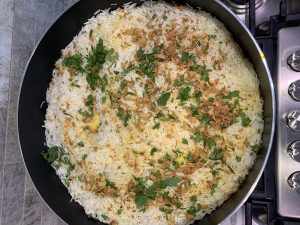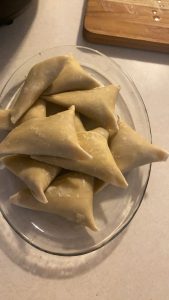Ramadan is a holiday that is celebrated by Muslims all around the world. It is a month of fasting, prayer, reflection and community. During Ramadan, Muslims wake up before dawn and eat a meal called suhoor, and afterward pray the morning prayers (Fajr). Muslims abstain from food and drink all the way until sunset, when it is time to break the fast with a meal called iftar. Breaking the fast with dates is universal for Muslims everywhere as it was a sunnah (practice) of the Prophet Muhammad (SAW). However, what is eaten for iftar varies, and often it is an opportunity to prepare cultural or comfort food one may not have during other times of the year.

For freshman Zahra Sait, a special dish of her mom’s is something she looks forward to, especially in Ramadan. “I love food, I will eat literally anything that comes my way, but I also really like my mom’s Persian pulao, it’s really good,” Sait said. Pulao is a popular rice dish found in many different regions of the world, including South Asia. For her, it signifies a connection she has with more distant ancestors. “Some of my family does come from Persia or Iran […], and it’s really special to me because only a selective number of people can make it in my family, and my mom’s one of them,” Sait said. Those other people include her grandmother and her grandfather’s brothers.
Sometimes, a more commonly known dish is popular in a household, as it is for sophomore Anessa Herzi. “I love sambusa, it’s very diverse, [because] it has carbs, proteins, vegetables so it just feels like a good blend and it’s very tasty,” Herzi said. A sambusa is a fried, triangular pastry filled with meat and vegetables. “It’s very well known as a food everyone can enjoy,” Herzi said, “It’s something I look forward to every single Ramadan.”

Many times though, due to extracurricular activities, there is not a lot of time to prepare a big meal. Either students have to eat iftar at school or at home in a hurry. Freshman Yacqub Ali often balances extracurriculars with breaking his fast on time. “We just get pizza if my mom is busy, or during tight times when I’m just getting back from school,” Ali said. But on days when he is not in a rush, he likes to help his mom in the kitchen. “I usually eat Suqaar and Jibati, which are Somali dishes […] it’s like beef stew wrapped in [flatbread]. I usually help my mom if I’m free, cut up the onion and then she just folds them and puts them together,” Ali said.
While what people eat for iftar might differ, the wonderful feeling of sharing iftar with friends and family is universal.